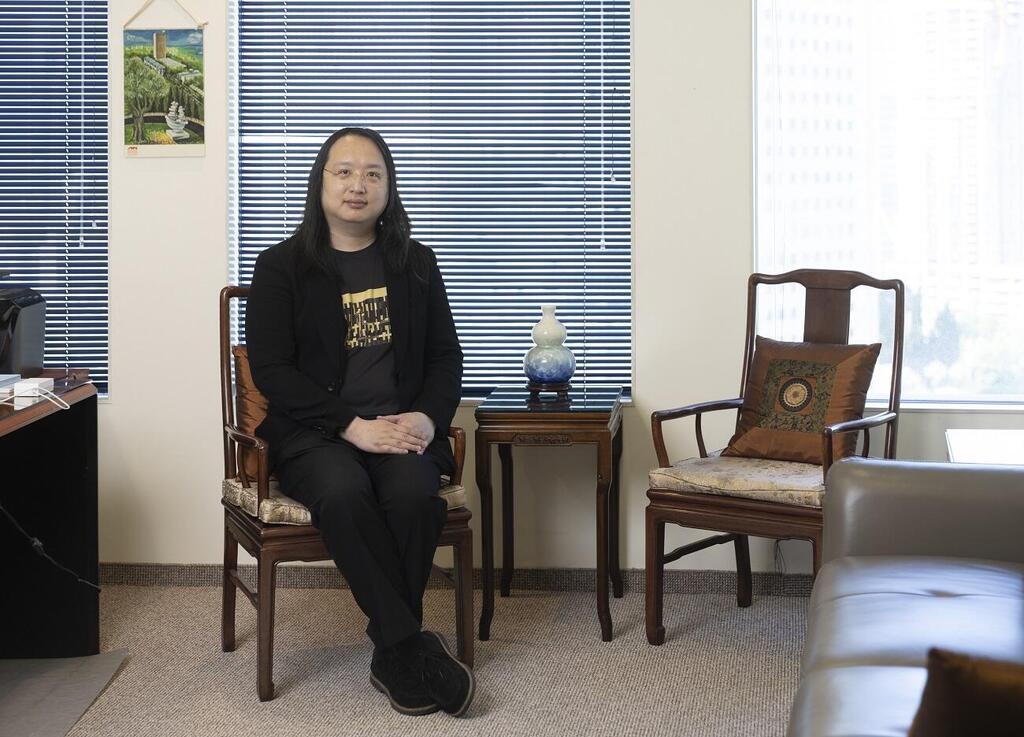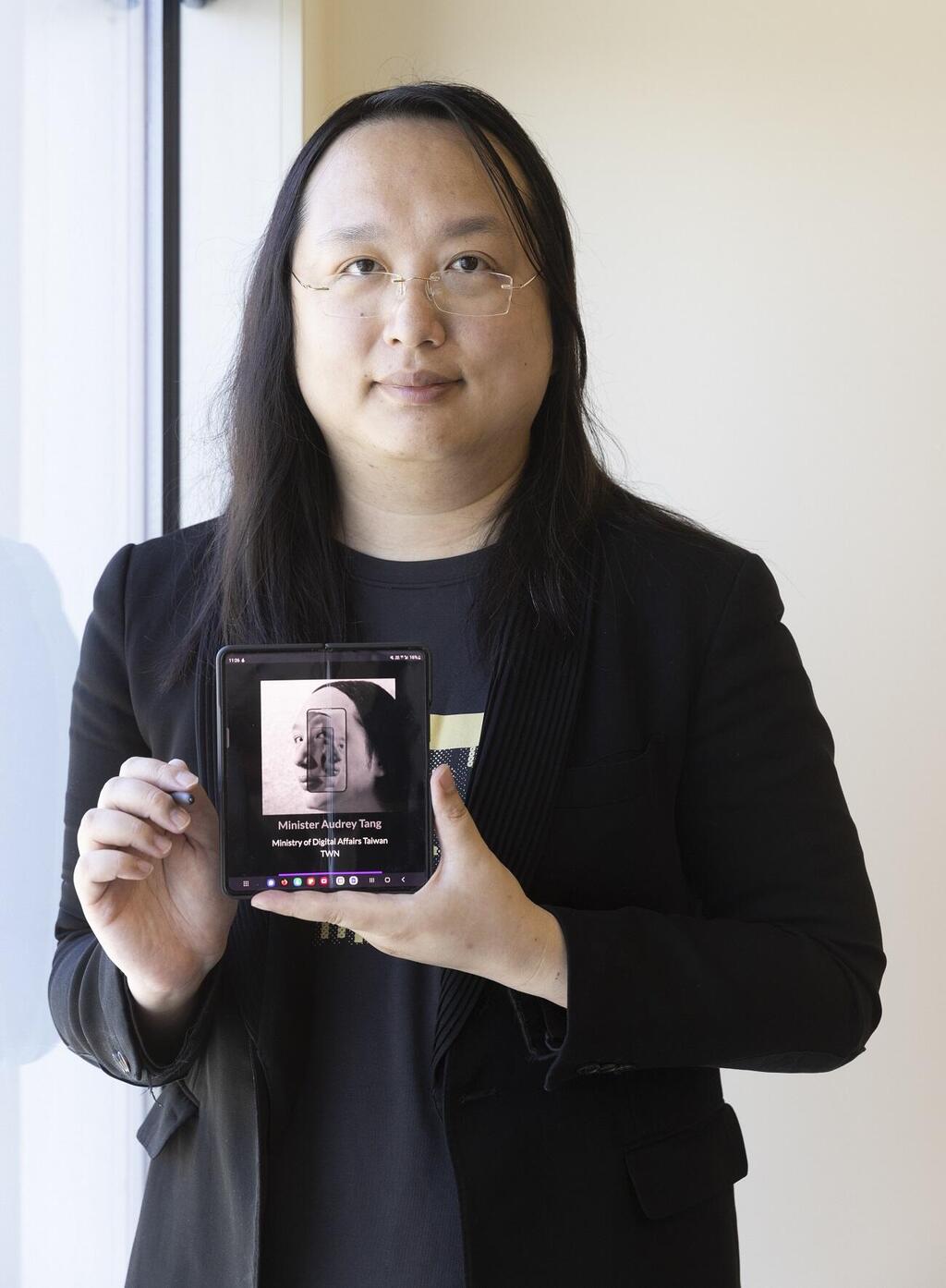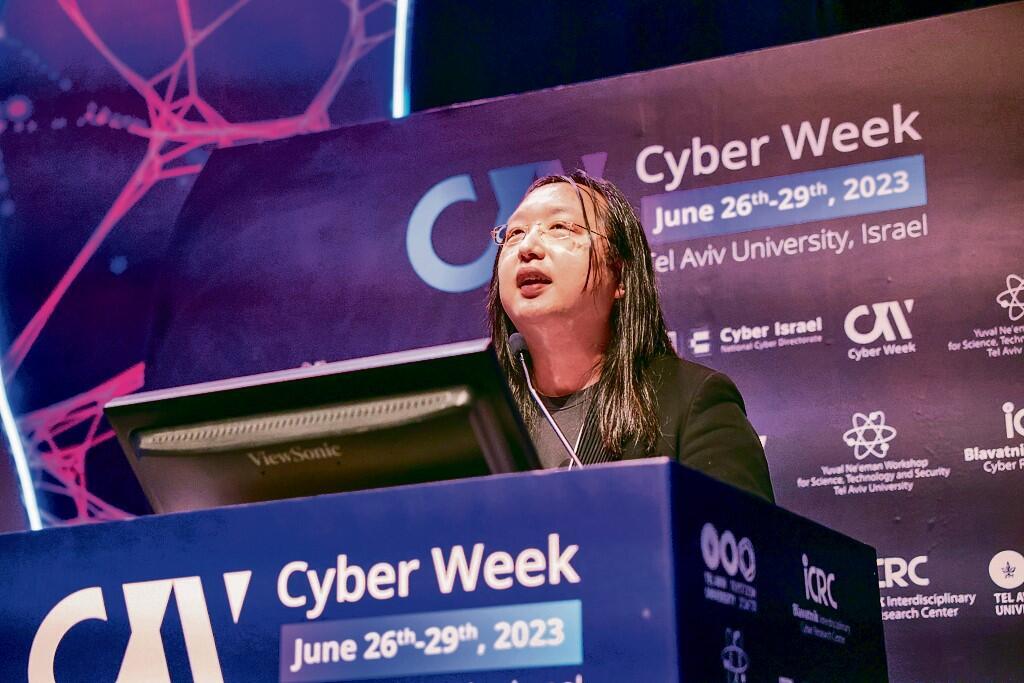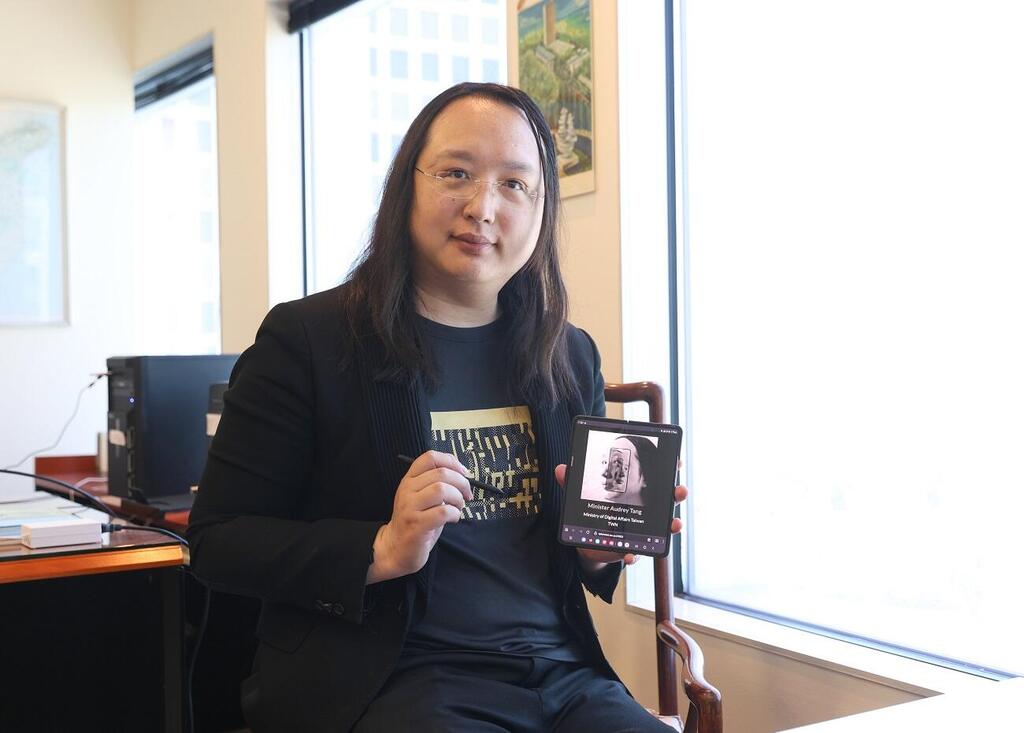Throughout Audrey Tang's unconventional life journey, she managed to shatter one glass ceiling after another. She was found to have an IQ of 180 at a young age. Before the age of eight, she was already learning programming. At the age of 15, she founded a software company. She became an advisor to Apple and later served as a minister in Taiwan's government at 35.
Read more:
But behind her rapid rise, there is an additional touching story: Audrey Tang was born male. At 24, she underwent a gender-affirming treatment, transitioning from male to female.
5 View gallery


Taiwan Digital Affairs Minister Audrey Tang at the Taipei Economic and Cultural Office in Tel Aviv
(Photo: Avigail Uzi)
Last week, she visited Israel as part of her role as Taiwan’s minister of digital affairs and granted us an interview in which she candidly shared her life story and the struggle she leads to preserve a clean Internet and democratic life in her homeland.
We met at the office of the head of the Taipei Economic and Cultural Office, Ya-Ping (Abby) Lee, in Tel Aviv’s Azrieli Towers. She hopes to get a taste of the city, maybe an authentic local restaurant, despite her tight schedule.
Tang, 42, has a fascinating life story. She is full of energy and open to discussing herself and a variety of topics. Despite holding a government position, she describes her role as working with the government rather than simply for it. She values direct interaction with the people and strives to maintain close connections with them.
The connection Tang speaks about is not theoretical: any person can come to her office during regular reception hours, meet her face to face, ask questions and offer ideas. She argues that transparent and reliable governance can only be achieved through such encounters and play a crucial part in safeguarding democracy.
She supports extreme transparency, which she also actively promotes. All her meetings are recorded, transcribed and made available to the public online. This interview included.
Quick response
Tang was born male, named Tang Tsung-han. At the age of 14, she dropped out of school and taught herself computers. She worked on projects involving open-source software, including translating programs into Mandarin. At the age of 24, she underwent gender-affirming surgery and adopted a female name. Today, she identifies as non-binary.
In August 2016, after leading and managing a series of projects online, she was invited to serve as a minister without portfolio in the government, officially becoming Taiwan's first transgender government official. She is a sought-after speaker at open-source software events and is known for her unique presentation style that combines humor, concise information and minimalist design.
Her involvement in politics began in March 2014 when she participated in the Sunflower Student Movement, which accused the Taiwanese leadership of negotiating and attempting to ratify a trade treaty with the People’s Republic of China in an undemocratic way. As a result, she was invited to develop a media literacy program in schools.
In 2016, she was appointed as a minister without portfolio, and two months later, she was appointed as the digital minister. In her role, she assists authorities in disseminating information and promoting policy across the Internet.
The digital minister also uses technology to promote democracy in her country, such as through the Join platform which allows regular everyday people to take an active part in shaping the government’s public policy.
“[O]n the Join platform, we talk about even more things than emerging technologies. For example, we talk about the right for unmarried women, to the benefits for her child, and that was before we legalized marriage equality. So, it also carries to lesbian couples, for example,” she says.
“[W]e chose specific examples within the marriage equality case. So, we didn’t talk about the definition of marriage, that would never work. But we talk about the welfare and the rights of the child that’s not yet born, right? So, we will all think about the child, and that makes it much easier for people to join together.
[W]hen Taiwan legalized marriage equality… we chose a model where we recognized the bylaws, so they enjoy the same rights and duties as… heterosexual marriage. But the difference is that the kinship, the in-laws, mother-in-law, father-in-law and so on, were not part of the equation. So, the people who care about kinship, lineage and those classical ideas, this is separate, but people do have the same rights.”
Tang stood out during the COVID-19 pandemic. She became an international ambassador for Taiwan's success early in the early stages of the pandemic, explaining the local model to the global media. She emphasizes that humor is often an important component in her explanations, in addition to the quick response. In Tang’s view, a response should take no more than two hours tops or else the humor won't hit.
She also says she believes it’s incumbent on the government to show trust in the people and not vice versa and the more trust the government has in its people, the more deserving of trust they become. Therefore, the government must make itself transparent to the people, rather than seeking the people to be transparent before it.
Democracy struggles to catch up to technology
Technology “changes so fast that the normal democratic channels are very slow in comparison. A vote, for example, is once every four years in Taiwan,” Tang says.
“So, like in the Uber case, we ask all the taxi drivers, all the Uber drivers, their passengers and so on, to voice their opinion, but not just typing their statement. They also press like or unlike for other people’s statements. But there is no reply button. So, there’s no way for people to make personal attacks. Just their ideas, feelings and reflection.
“In our experience, if we talk about abstract things, like sharing economy, gig economy, then this tool does not work. This tool only works when you talk about the specific case, for example, somebody with a driver’s license but not professional driver’s license, picking up strangers, they meet on an app, on the way to work, charging them to it… like you need to have a specific story that people can relate to. And then ask people how do you feel about it. [W]e take those small-scale technology and make it national, so that everybody can chime in.
“And very quickly, we saw on the Uber conversation, that everybody actually agreed on most of the points. There’s just one that people don’t agree. Whether to call it sharing economy, or geek or extractive economy, that’s different ideologies. But actually, everybody agrees there should be insurance, there should be registration…"
Combating the scourge of fake news
Tang says the Taiwanese government does not use the term "fake news" but rather uses "Foreign Information Manipulation Interference" or FIMI for short. As the daughter of journalists herself, Tang reveres that profession and insists that the local government does not blame journalists for spreading misinformation. Additionally, it does not ask social media platforms to remove stories deemed problematic, but rather tack notes by independent fact-checkers adding context.
She also laments how “polarization sells more advertisement. Polarization delivers more clicks and people become addicted to polarization. And that’s the main problem.”
Before joining government, Tang was also a member of a committee dealing with educational programs in schools. “Our new curriculum, new as of 2019, we took out all the words literacy. So, no media literacy, digital literacy, data literacy, no. We replaced that with competence. So, media competence, digital competence,” she says.
“The difference is that literacy is when you’re consuming the information. With critical thinking, maybe, but still a consumer. But competence is when you’re a producer of information, when you make information.”
The initiative allows students as young as junior high, among other things, to fact-check presidential candidates during live debates using the civil society fact-checking community Confacts.
“And we found it’s not the fact-check reports that protect the mind against polarization. It’s a process of going through fact-checking that inoculates a mind against polarization. So, if all the students can get the experience, like a journalist do, right? Checking the sources, checking the biases, making sure they’re two uncorrelated sources before saying something really happened and so on. If they go through this basic journalism one-on-one training, then they become immune or inoculated against polarization.”
Bridge and another bridge
When the Sunflower Student Movement broke out in 2014, Tang promptly resigned from her role as an Apple advisor to support the protesters in creating an internal communication network.
The government made efforts to engage with citizens, especially the younger generation, and approached her to develop vTaiwan, a civic website. This platform facilitates discussions on contentious topics with the goal of fostering consensus among divergent perspectives and building trust.
Tang's path to a government position was relatively short. In the 2016 elections, Tsai Ing-wen and the Democratic Progressive Party came to power, and Tang, at the age of only 35, received an offer to join the government as a minister without portfolio. This made her the youngest serving minister in Taiwan's history. Additionally, Tang is the world's first transgender government official.
“When I was 23, 24, I took a testosterone test and the doctors tell me that I have a natural level of testosterone between normal female and normal male. So similar to, I remember he said, like an 80-year-old man or something like that,” she says.
Afterward, the choice to undergo a hormonal transition from male to female was clear. Tang began openly embracing her transgender identity, specifically as non-binary. She states that she has not faced any discrimination based on this aspect of her identity.
Her parents accepted her non-conventional identity, as did her devout Catholic grandmother, who is nearing 90.
Taiwan is known for its tolerance toward the LGBTQ+ community. In 2018, the country introduced the option to select transgender as a gender on the new electronic identity cards, alongside male and female.
When asked where she sees herself in five years, Tang says, “I will keep building bridges…. I’m non-affiliated or non-binary when it comes to gender, or party, or ethnic group, or whatever. So, basically non-binary in everything… And I think five years from now, this politics of building bridges, of what I call plurality, building collaboration across diversity, I think will become much more mainstream. It will become an acceptable, or even preferred, political attitude, not just in Taiwan, but in all the liberal democracies.”






